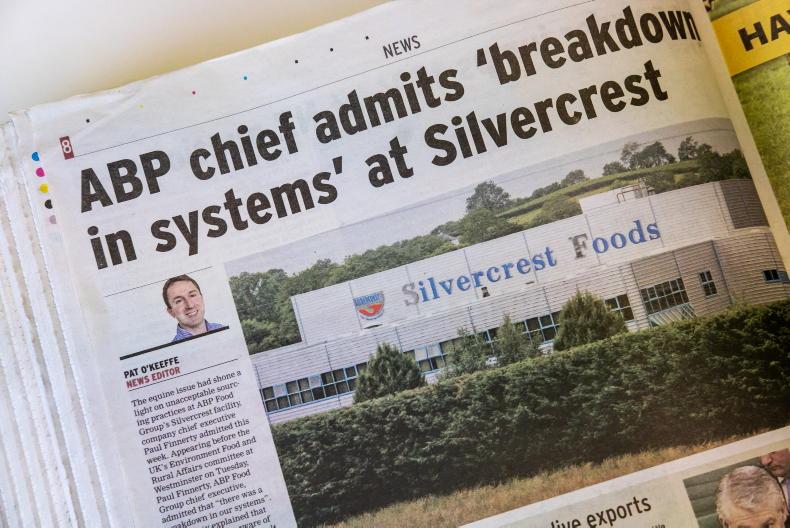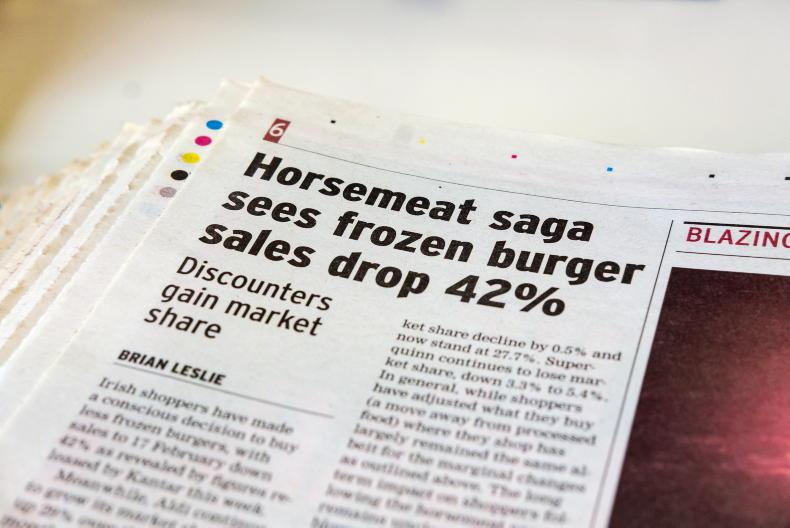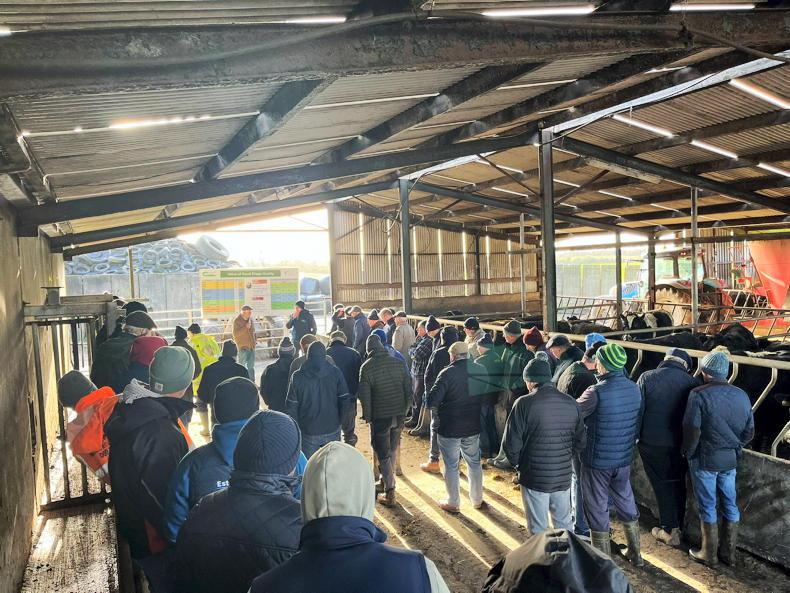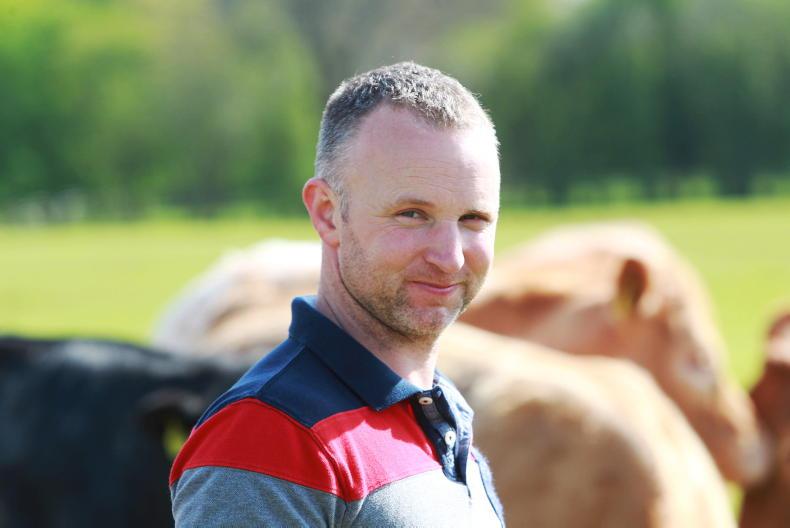January 15 2013
Farmers and consumers were left reeling by the results of an investigation by the Food Safety Authority of Ireland (FSAI) that Irish burgers had been found to contain traces of horsemeat.
Of the 27 beef burger products analysed, 10 burger samples (37%) were positive for equine DNA.
A press release issued by the FSAI on the evening of 15 January said the beef burger products that tested positive for horse DNA were produced by two processing plants (Liffey Meats and Silvercrest Foods) in Ireland and one plant (Dalepak Hambleton) in the UK.
They were on sale in Tesco, Dunnes Stores, Lidl, Aldi and Iceland.
In nine of the 10 beef burger samples from these retailers, horse DNA was found at very low levels.
Retailers immediately began withdrawing beef burger products manufactured in the named plants.
In one sample from Tesco, the level of horse DNA indicated that horsemeat accounted for approximately 29% relative to the beef content. This meat was traced back to Silvercrest Foods, in Ballybay, Co Monaghan, owned by ABP Food Group.
Silvercrest Foods suspended its production that week.
At the time it employed 140 staff in the production of frozen burgers. The plant accounted for 5% of ABP’s total turnover, supplying many retailers and burger outlets across Ireland and the UK.
Dalepak was the other subsidiary of the ABP Food Group where the contaminated beef burger products were produced.

January 23 2013
A week later, Burger King announced that it would no longer source beef from ABP as a result of the burger scandal.
This was a major blow for ABP, with sources estimating that Burger King represented 60% of Silvercrest’s business and the contract potentially worth in the region of €30m per annum to ABP.
January 26 2013
Meanwhile, interrogation of the food supply chain had moved abroad. Investigations revealed Poland to be the source of frozen beef trim contaminated by horsemeat.
Mainstream media attention began to focus on the low value frozen beef burger market.

Horse Meat Scandal Headlines from the Irish Farmers Journal in 2013
30 January 2013
Tesco and the Co-operative announced that they would no longer purchase frozen burgers from Silvercrest Foods. Tesco stated that Silvercrest had used meat in its products that did not come from Ireland or England, despite instruction that only such beef should be used in its frozen beef burgers.
ABP swiftly issued an apology to farmers.
In a statement to the Irish Farmers Journal, Paul Finnerty, then CEO of ABP Food Group said: “These issues that arose in Silvercrest do not apply to any other part of our business.
"ABP has never knowingly bought horsemeat, and 90% of all the meat bought by Silvercrest Foods is from Ireland and Britain.”
7 February 2013
The Irish Farmers Journal reported that Kepak was closing in on securing the lucrative Burger King deal that Silvercrest lost, after Burger King representatives were seen visiting the Kepak plant in Clonee.
Any deal between an Irish processor and the fast-food company would provide a major boost to the Irish beef trade.
ABP’s subsidiary Silvercrest had by now lost four main contracts namely, Burger King, Tesco, the Co-operative and Aldi.
Silvercrest had been generating an estimated €80m annually from the sale of frozen burgers.

Horse Meat Scandal Headlines from the Irish Farmers Journal in 2013
13 February 2013
Minister for Agriculture Simon Coveney, as chair of the EU Council of Agriculture and Fisheries Ministers, convened an informal meeting in Brussels at which they agreed to conduct an EU-wide programme of DNA testing of meat products and further testing of horsemeat residues in slaughterhouses.
23 February 2013
Despite fears that the scandal could derail the demand for Irish beef exports, reports from within the industry were of a very strong demand for good quality fresh Irish beef.
As a result, farmers enjoyed what were record prices for finished cattle in the months that followed.
9 March 2013
According to figures released by Kantar, burger sales dropped 42% across the country as Irish shoppers made a conscious decision to buy less frozen burgers.
14 March 2013
It was revealed that Naas-based QK Meats had received a positive test result for equine DNA in beef from Poland as far back as June 2012 – yet failed to inform the Department of Agriculture until three weeks after the horsemeat debacle erupted.
Speaking in the Dáil that day, Minister for Agriculture Coveney strongly criticised management at both QK Meats and Silvercrest.
“Given the reputation issues for the Irish food industry, I believe the practices by two companies of not respecting customer specifications and of knowingly withholding information about problems in the supply chain are totally unacceptable,” Coveney said.
16 April 2013
Ireland received a clear round in EU horsemeat test results released on Tuesday, 16 April 2013.
There were no positive tests for horse DNA in Ireland or Britain – but it was becoming clear that horsemeat in the beef supply chain was an EU-wide problem.
The EU testing programme found that one in 20 or 4.66% of beef products assessed contained horsemeat. Twenty-two of the EU’s 27 member states recorded positive tests for equine DNA in products it should not have been in.
Bord Bia welcomed the announcement, saying: “The quality of reputation of Irish beef has remained undiminished throughout what proved to be a highly challenging period.”
However, IFA livestock chair Henry Burns warned that lessons should be learned from the episode, adding that controls should be stricter.
“Only Irish raw materials should be used in meat products that are labelled and sold as Irish,” he said.
There were concerns raised that the auditing of meat processors at the time was not as rigorous as those carried out at farm level.

Horse Meat Scandal Headlines from the Irish Farmers Journal in 2013
27 April 2013
Kepak acquired Silvercrest Foods in Co Monaghan, and ABP announced its exit from the Irish frozen burger market.
The Irish Farmers Journal reported on 27 April that Kepak’s burger business at the time, combined with Silvercrest business, had the potential to produce almost 30,000 tonnes of burgers per annum.
There were 170 workers in Silvercrest when the horsemeat issue was uncovered, however ABP managed to maintain all staff on full pay, despite production being suspended since January.
May 22 2013
Kepak won the Burger King contract and would now supply beef to Burger King outlets in Ireland and Britain.
Following the global fast food chain’s decision to break ties with ABP subsidiary Silvercrest during the horsemeat scandal, it had switched to sourcing its burger patties from Germany and Italy.

Horse Meat Scandal Headlines from the Irish Farmers Journal in 2013
Aftermath
In the aftermath of the horsemeat incident, the FSAI surveyed consumers on their purchases of different types of meat and meat products. Of those surveyed who would have frequently purchased frozen burgers in supermarkets, 51% said they bought less following the horsemeat scandal.
Asked about fresh burgers bought at butcher counters, 16% of those surveyed bought less and 15% said they bought more.
Mininster for Agriculture Simon Coveney, in an FSAI report about the saga, said the investigation had concluded that in the case of Silvercrest and Rangeland Meats (which had notified the Department of Agriculture of the presence of equine DNA in certain consignments of Polish labelled meat ingredients which did not enter the food chain) that there was no evidence that they deliberately purchased or used horsemeat in their production processes or that these companies were relabelling or tampering with inward consignments.
Minister Coveney said that it transpired that what had been uncovered was “a pan- European problem of fraudulent mislabelling of certain beef products”.
“Almost all member states have been affected by the problem. Indeed it has been uncovered outside of the European Union. It became a global problem affecting some large global companies and international food brands.”
January 15 2013
Farmers and consumers were left reeling by the results of an investigation by the Food Safety Authority of Ireland (FSAI) that Irish burgers had been found to contain traces of horsemeat.
Of the 27 beef burger products analysed, 10 burger samples (37%) were positive for equine DNA.
A press release issued by the FSAI on the evening of 15 January said the beef burger products that tested positive for horse DNA were produced by two processing plants (Liffey Meats and Silvercrest Foods) in Ireland and one plant (Dalepak Hambleton) in the UK.
They were on sale in Tesco, Dunnes Stores, Lidl, Aldi and Iceland.
In nine of the 10 beef burger samples from these retailers, horse DNA was found at very low levels.
Retailers immediately began withdrawing beef burger products manufactured in the named plants.
In one sample from Tesco, the level of horse DNA indicated that horsemeat accounted for approximately 29% relative to the beef content. This meat was traced back to Silvercrest Foods, in Ballybay, Co Monaghan, owned by ABP Food Group.
Silvercrest Foods suspended its production that week.
At the time it employed 140 staff in the production of frozen burgers. The plant accounted for 5% of ABP’s total turnover, supplying many retailers and burger outlets across Ireland and the UK.
Dalepak was the other subsidiary of the ABP Food Group where the contaminated beef burger products were produced.

January 23 2013
A week later, Burger King announced that it would no longer source beef from ABP as a result of the burger scandal.
This was a major blow for ABP, with sources estimating that Burger King represented 60% of Silvercrest’s business and the contract potentially worth in the region of €30m per annum to ABP.
January 26 2013
Meanwhile, interrogation of the food supply chain had moved abroad. Investigations revealed Poland to be the source of frozen beef trim contaminated by horsemeat.
Mainstream media attention began to focus on the low value frozen beef burger market.

Horse Meat Scandal Headlines from the Irish Farmers Journal in 2013
30 January 2013
Tesco and the Co-operative announced that they would no longer purchase frozen burgers from Silvercrest Foods. Tesco stated that Silvercrest had used meat in its products that did not come from Ireland or England, despite instruction that only such beef should be used in its frozen beef burgers.
ABP swiftly issued an apology to farmers.
In a statement to the Irish Farmers Journal, Paul Finnerty, then CEO of ABP Food Group said: “These issues that arose in Silvercrest do not apply to any other part of our business.
"ABP has never knowingly bought horsemeat, and 90% of all the meat bought by Silvercrest Foods is from Ireland and Britain.”
7 February 2013
The Irish Farmers Journal reported that Kepak was closing in on securing the lucrative Burger King deal that Silvercrest lost, after Burger King representatives were seen visiting the Kepak plant in Clonee.
Any deal between an Irish processor and the fast-food company would provide a major boost to the Irish beef trade.
ABP’s subsidiary Silvercrest had by now lost four main contracts namely, Burger King, Tesco, the Co-operative and Aldi.
Silvercrest had been generating an estimated €80m annually from the sale of frozen burgers.

Horse Meat Scandal Headlines from the Irish Farmers Journal in 2013
13 February 2013
Minister for Agriculture Simon Coveney, as chair of the EU Council of Agriculture and Fisheries Ministers, convened an informal meeting in Brussels at which they agreed to conduct an EU-wide programme of DNA testing of meat products and further testing of horsemeat residues in slaughterhouses.
23 February 2013
Despite fears that the scandal could derail the demand for Irish beef exports, reports from within the industry were of a very strong demand for good quality fresh Irish beef.
As a result, farmers enjoyed what were record prices for finished cattle in the months that followed.
9 March 2013
According to figures released by Kantar, burger sales dropped 42% across the country as Irish shoppers made a conscious decision to buy less frozen burgers.
14 March 2013
It was revealed that Naas-based QK Meats had received a positive test result for equine DNA in beef from Poland as far back as June 2012 – yet failed to inform the Department of Agriculture until three weeks after the horsemeat debacle erupted.
Speaking in the Dáil that day, Minister for Agriculture Coveney strongly criticised management at both QK Meats and Silvercrest.
“Given the reputation issues for the Irish food industry, I believe the practices by two companies of not respecting customer specifications and of knowingly withholding information about problems in the supply chain are totally unacceptable,” Coveney said.
16 April 2013
Ireland received a clear round in EU horsemeat test results released on Tuesday, 16 April 2013.
There were no positive tests for horse DNA in Ireland or Britain – but it was becoming clear that horsemeat in the beef supply chain was an EU-wide problem.
The EU testing programme found that one in 20 or 4.66% of beef products assessed contained horsemeat. Twenty-two of the EU’s 27 member states recorded positive tests for equine DNA in products it should not have been in.
Bord Bia welcomed the announcement, saying: “The quality of reputation of Irish beef has remained undiminished throughout what proved to be a highly challenging period.”
However, IFA livestock chair Henry Burns warned that lessons should be learned from the episode, adding that controls should be stricter.
“Only Irish raw materials should be used in meat products that are labelled and sold as Irish,” he said.
There were concerns raised that the auditing of meat processors at the time was not as rigorous as those carried out at farm level.

Horse Meat Scandal Headlines from the Irish Farmers Journal in 2013
27 April 2013
Kepak acquired Silvercrest Foods in Co Monaghan, and ABP announced its exit from the Irish frozen burger market.
The Irish Farmers Journal reported on 27 April that Kepak’s burger business at the time, combined with Silvercrest business, had the potential to produce almost 30,000 tonnes of burgers per annum.
There were 170 workers in Silvercrest when the horsemeat issue was uncovered, however ABP managed to maintain all staff on full pay, despite production being suspended since January.
May 22 2013
Kepak won the Burger King contract and would now supply beef to Burger King outlets in Ireland and Britain.
Following the global fast food chain’s decision to break ties with ABP subsidiary Silvercrest during the horsemeat scandal, it had switched to sourcing its burger patties from Germany and Italy.

Horse Meat Scandal Headlines from the Irish Farmers Journal in 2013
Aftermath
In the aftermath of the horsemeat incident, the FSAI surveyed consumers on their purchases of different types of meat and meat products. Of those surveyed who would have frequently purchased frozen burgers in supermarkets, 51% said they bought less following the horsemeat scandal.
Asked about fresh burgers bought at butcher counters, 16% of those surveyed bought less and 15% said they bought more.
Mininster for Agriculture Simon Coveney, in an FSAI report about the saga, said the investigation had concluded that in the case of Silvercrest and Rangeland Meats (which had notified the Department of Agriculture of the presence of equine DNA in certain consignments of Polish labelled meat ingredients which did not enter the food chain) that there was no evidence that they deliberately purchased or used horsemeat in their production processes or that these companies were relabelling or tampering with inward consignments.
Minister Coveney said that it transpired that what had been uncovered was “a pan- European problem of fraudulent mislabelling of certain beef products”.
“Almost all member states have been affected by the problem. Indeed it has been uncovered outside of the European Union. It became a global problem affecting some large global companies and international food brands.”















SHARING OPTIONS